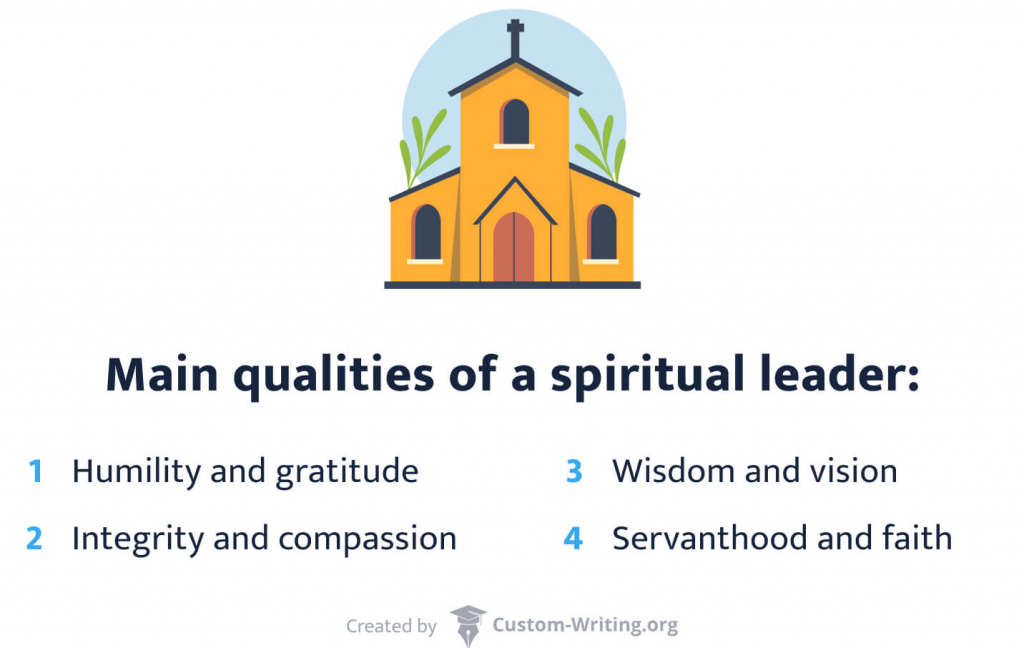When you hear the phrase “spiritual leadership,” you probably think it’s only associated with religion. But did you know that this form of leadership can also be found in business?
The book Spiritual Leadership: Moving People on to God’s Agenda by Henry and Richard Blackaby is a good starting point for those who want to learn about this topic. Another classic dedicated to this subject is Spiritual Leadership: Principles of Excellence for Every Believer by J. Oswald Sanders.

Whether you’re curious about spiritual leadership or need to write a summary of Blackaby’s book, you are in the right spot! In this article by our custom-writing team, you will:
- learn about spiritual leadership,
- find a model summary essay,
- discover 20 hottest spiritual leadership topics,
- and more!
⛪ What is Spiritual Leadership?
Spiritual leadership is a type of leadership that is aimed at helping people accomplish spiritual goals. A spiritual leader is someone who incorporates vision, faith, and selfless love into the way they deal with others to encourage their followers to gain a sense of significance and connection.
Aside from the church, spiritual leadership can also be used in the workplace. Many people view their job as a way to find meaning in life. A true leader realizes the importance of incorporating spiritual goals into the workplace. They strive to create a community of people with shared values and beliefs.
Is this approach practical? According to Frontiers, applying spiritual leadership to an organization may lead to a more humane environment, support, trust, and a higher commitment from employees and community members. So, this approach is absolutely worth it.
🔥 Spiritual Leadership Essay Topics
- Definitions and key characteristics of spiritual leadership.
- What is the importance of spiritual leadership in organizations and communities?
- Theoretical perspectives and empirical evidence of the link between spirituality and leadership.
- Discuss the role of ethics in spiritual leadership.
- What is the influence of religious traditions on leadership?
- Write about the impact of spirituality on employee well-being and performance.
- Describe the challenges of measuring and evaluating spiritual leadership.
- Personal and organizational factors of being a spiritual leader.
- Mindfulness and contemplative practices in the workplace.
- Spiritual leadership and social responsibility.
- Assess the role of humility and authenticity in leadership.
- Discuss the meaning of spiritual intelligence for a leader.
- Challenges and opportunities of leading diverse spiritual communities.
- Ways in which spiritual leadership fosters resilience in coping with adversity.
- How does spiritual leadership relate to emotional intelligence?
- The role of spiritual leaders in promoting social justice.
- Spiritual leader’s influence on organizational culture and climate.
- Discuss the possible tensions between spiritual and secular leaders.
- How does spiritual leadership foster creativity and innovation?
- The future of spiritual leadership: emerging trends and directions.
Essay on Spiritual Leadership: Prompts
Spiritual Leadership: Oswald Sanders Prompts
- In what ways does spiritual leadership differ from other forms of leadership? Focus on how Sanders defines spiritual leadership and the key characteristics of a spiritual leader.
- According to Sanders, how does a spiritual leader’s relationship with God impact their ability to lead others? Mention the role of humility, integrity, and wisdom in your essay.
- According to Sanders, what is the ultimate goal of spiritual leadership? In particular, how does a spiritual leader inspire followers to move closer to God and follow His will?
- Discuss how the characteristics of a spiritual leader identified by Sanders can be applied in modern society. What challenges do spiritual leaders face in today’s world? How can they effectively lead their followers toward a deeper relationship with God?
Spiritual Leadership Qualities Prompts
- Discuss how compassion enables spiritual leaders to guide and inspire others. How do qualities like this differ from those typically associated with other forms of leadership?
- How can a spiritual leader cultivate wisdom and discernment in decision-making? In particular, focus on faith’s role in a spiritual leader’s ability to make difficult decisions.
- Write about the role of servanthood in spiritual leadership. Show how a spiritual leader can balance their commitment to serving others with their own needs and responsibilities.
- How does a sense of purpose and direction enable a spiritual leader to guide others? Point out how a spiritual leader can empower others and encourage them to develop their talents.

Fundamentals of Spiritual Leadership Prompts
- How do the fundamentals of spiritual leadership enable a spiritual leader to impact their community positively? You may focus on connection with God, service, and values. Provide examples to support your answer.
- In what ways can a spiritual leader balance their vision for their community with the needs of their followers? Discuss how this balance can be achieved while remaining rooted in the values of faith.
- What role does accountability play in spiritual leadership? Describe the importance of seeking constructive criticism as a means of personal growth.
- In what ways can a spiritual leader empower others to lead? Suggest strategies for fostering a culture of empowerment and support within an organization or a community.
Spiritual Leadership for Challenging Times Prompts
- In what ways can spiritual leadership provide comfort and hope during hard times? Focus on the role of spiritual leaders in supporting people during times of struggle.
- How can spiritual growth and transformation be achieved during challenging times? Discuss the potential benefits of using difficult situations as an opportunity for spiritual development.
- In what practical ways can spiritual leaders encourage community during challenging times? How can these efforts support people in overcoming adversity?
- Discuss the role of spiritual leaders in promoting service and action during challenging times. How can these efforts inspire individuals and communities to create positive change?
🔮 Spiritual Leadership: Moving People on to God’s Agenda Summary
Spiritual Leadership: Moving People to God’s Agenda is a book by Henry and Richard Blackaby. It was published in 2011 and is considered one of the best books on successful leadership, spirituality, and direction. Many people feel it is too restrictive and unnecessary to live by the Bible’s standards. However, the authors try to prove that it is possible to accomplish this. Besides, following the principles of spiritual leadership can be highly beneficial. The following summary presents a description of the book’s thirteen chapters.
In chapter one, the authors speak about the role of leaders in the world. Nowadays, leaders can learn a lot of theory online, but the pressure to acquire information is still very high. The authors recommend reading the Bible and considering God’s rules as direction in this situation. The writers also discuss the role of leadership in business, religion, and politics. For instance, there is a lot of need for leaders in the church because the lack of spiritual leadership means the end of faith. In business, leaders should look for ways to improve employee performance through spirituality.
Chapter two is called The Leader’s Role: What Leaders Do and focuses on the definitions of leadership. A spiritual leader is a person who applies the rules of God in their life and follows Jesus’ example. Several characteristics of a good spiritual leader are also described.
Chapter three of the book is called The Leader’s Preparation: How God Develops Leaders. According to this chapter, leaders are not born this way but must work on their qualities to become more spiritual. Strong faith and obedience are also required for that.
Chapter four speaks about how vision is integral to leadership. It is seen as a revelation from God, and following His direction can be beneficial for people to gain true success.
The fifth chapter discusses organizational goals. Some of them are seen as worthy, and some are not. Unworthy goals include perfectionism, results, and size. When people pursue these goals, they move away from God’s plan. A worthy agenda is to focus on personal development to be closer to God.
Chapter six is called and it speaks about the traits that spiritual leaders should have. These include communicating with God and searching for His authentication. The main goal of their activity is not to promote themselves but to assist other people in becoming closer to God.
Chapter seven is called The Leader’s Influence: How Leaders Lead. According to the book, leaders should follow the example of Jesus, who showed sacrifice and servitude to people. They should be hardworking and have good interpersonal skills.
The following chapter eight is called The Leader’s Decision Making. Spiritual leaders should rely on God to help them find solutions. However, sometimes a decision can be wrong, and they should be able to accept responsibility for their choices. Leaders should remember that they are accountable to God.
Chapter nine is called The Leader’s Schedule: Doing What’s Important. It explains how spiritual leaders arrange their lives around serving God and people. They must be ready to stick to a routine, stay focused, and reject other opportunities that impede service.
Chapter ten is called Leadership and Change and focuses on implementing changes. True leaders must be ready to accept new assignments and continuous changes in organizational culture to support people till the end.
Chapter eleven discusses Building Effective Teams, explaining that leaders must assemble teams with diverse experiences and opinions on important matters. The leader’s job is to hire suitable people to develop new ideas and direct the organization.
Chapter twelve, The Leader’s Pitfalls: What Disqualifies Leaders? discusses the qualities that influence leadership negatively: pride, sexual sin, greed, laziness, apathy, carelessness, and oversensitivity. These imperfections distract leaders from God and their other true goals.
Chapter thirteen, called The Leader’s Reward, talks about the rewards leaders get for their activities. The first reward is spiritual for the fulfillment of God’s purpose, and the second reward comes in the personal areas. Spiritual leaders are usually successful in marriage and have good friends.
The book, as a whole, makes it clear that spiritual leadership combines the Bible fundamentals and valuable advice regarding personal growth. It focuses on improving people’s lives by leading them toward God.
Thank you for reading the article till the end! We hope you found the summary and our explanation of spiritual leadership useful. You are welcome share this article with your friends if they are looking for ideas and inspiration on this topic.
❓ Spiritual Leadership
What Is the Role of Spirituality in Leadership?
Spirituality plays a vital role in leadership due to ethical attitudes that reinforce personal, organizational, and team values. Spiritual leaders are the servants of people who assist in restoring hope, helping others to develop a more meaningful life, and improving workplace commitment.
What Does the Bible Say About Spiritual Leadership?
The Bible reminds spiritual leaders that they are held accountable by God not to abuse power. It also gives requirements for becoming a spiritual leader: hospitality, love, modesty, love for God, correction from life lessons, and other qualities.
What Is the Spiritual Gift of Leadership?
Spiritual gifts in Christianity are special powers given by God. The spiritual gift of leadership is an opportunity to serve God, help the church grow, share the Scriptures through the ministry, and take care of one’s community. It is considered the ultimate goal of serving God.
Why Is Spiritual Leadership Important Today?
Spiritual leadership is essential because spirituality is valuable in today’s world. It helps motivate people to grow and live a life full of meaning and selfless love. It improves the community, family, personal relationships, and people’s mental well-being.
🔍 References
- Does Spirituality Make a Difference in Leadership?: Pepperdine University
- Spiritual Leadership at the Workplace: Perspectives and Theories: NIH
- Spiritual Leadership and Organizational Commitment: The Mediation Role of Workplace Spirituality: Taylor and Francis Online
- What Does It Mean To Be A Spiritual Leader In The Workplace?: Forbes
- Spiritual Leadership: Implications for Managerial Action: Research Gate
- Spirituality in Leadership: Reference for Business
- The Importance of Spiritual Leadership in Your Workplace: Bethel University







![How to Stop Corruption Essay: Guide & Topics [+4 Samples]](https://custom-writing.org/blog/wp-content/uploads/2020/12/close-up-two-hands-while-paying-money-284x153.jpeg)

![Why I Want to be a Pharmacist Essay Topics & How to Write [2026]](https://custom-writing.org/blog/wp-content/uploads/2020/12/cut-out-medicament-drug-doctor-medical-1-284x153.jpg)

![Dengue Fever 5-Paragraph Essay: How to Write [2026 Update]](https://custom-writing.org/blog/wp-content/uploads/2020/12/scientist-hand-is-holding-test-plate-284x153.jpg)